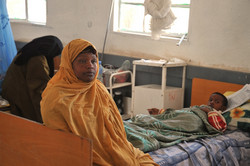A helping hand for healthcare in Africa
The EU-funded project HURAPRIM(opens in new window) (Human resources for primary health care in Africa) developed innovative interventions and policies to address the HRH crisis. The objectives were to analyse the situation of HRH in Africa, and to understand the complexity of its causes of deficit. HURAPRIM partners designed interventions, strategies and policies to improve the situation and maximise networking and synergies. The project brought together three European partners and six African partners in five countries, representing specific situations in HRH. The designed interventions were tested through case studies in the partner countries, tailored to each country's individual HRH situation. Various research tasks were performed to arrive at a better understanding of the scope and causes of the deficit in HRH. This research included a review of the literature on existing human resources and participatory research with project partners. A confidential enquiry into maternal and child deaths in Mali and Uganda was also performed and migrant health workers were interviewed. Systematic reviews of the research conducted have resulted in a paper that provides a summary of identified issues. Ideas and proposals of possible interventions were discussed at the kick-off meeting in Cape Town, South Africa. Results show there are clear economic and political restraints affecting health workers' issues and demands. Bad work conditions, low salaries and a very high workload are also leading causes of declining HRH. There are noteworthy policy decisions being made in South Africa with regards to National Health Insurance (NHI) and the re-engineering of primary healthcare (PHC). One of the ways this is being achieved is through the launching of ward-based PHC outreach teams. The city of Johannesburg has collaborated with medical research centres to identify 20 pilot sites. These 20 sites belong to the most impoverished areas. The HURAPRIM project will contribute to discussions and policy actions on an international level. All of the scheduled interventions are directly anchored on actual health policy commitments and plans. This will guarantee the practical relevance of every achievement of the project.






